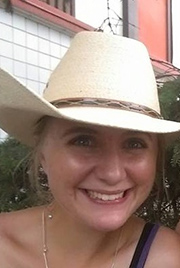Blackie School Green Day
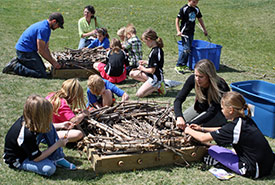
Students making ferruginous hawk nesting platforms. (Photo by Sandi Riemersma)
The first of June was an exciting day in the small community of Blackie, Alberta. “Why is that,” you ask? It was the first ever Blackie School Green Day! Close to 20 partners came together to offer their knowledge and resources to more than 130 students in grades one to eight at what will hopefully become an annual event. I felt very privileged to be a part of a day full of youth education and fun – a nice switch up from my role as the Alberta range and riparian summer assistant.
To start the day off we were welcomed by Vice Principal Deb Valette and saw presentations from the three groups of students who placed in the top 10 at the Southern Alberta Caring For Our Watersheds competition. The students, who were mentored by Environmental Biologist Sandi Riemersma, presented their projects on microbeads, composting and light pollution. After the opening presentations students toured the display tables to find answers to the questions in their Green Day workbooks.
My display was a triple whammy – I was providing information about the Oldman Watershed Council (OWC), the Nature Conservancy of Canada (NCC) and Agrium’s Caring For Our Watersheds Contest.
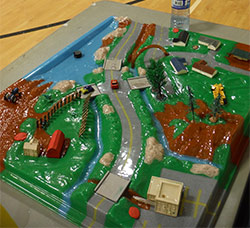
Interactive model of a watershed (Photo by Kelsey Cartwright/ NCC staff)
The watershed model was an interactive and fun way to show not only how a watershed works but how the processes within are all interconnected. I asked the kids to pick a couple of spots on the model for me to pour water on after they guessed where the water would end up. This model is extremely accurate. No matter where I poured the water it ended up in the same common waterbody! The model was very helpful in demonstrating the interconnected nature of a watershed and how stewardship is important to maintaining functional, intact landscapes and their ability to provide invaluable ecosystem services such as water purification, flood regulation and pollination among many other important processes.
The Eastern Slopes of Alberta are the headwaters for the Oldman, South Saskatchewan and Hudson Bay watersheds and provide us with billions of dollars worth of ecosystem services – for free! One of the questions in the workbooks was: “What can you do to help your watershed?” I used this as an opportunity to explain NCC’s Conservation Volunteers (CV) program. Three days prior to Green Day, I’d been part of a CV event at the Waldron Ranch that saw us plant close to 600 willows in riparian areas to stabilize the banks, thus improving water quality and creating new wildlife habitat.
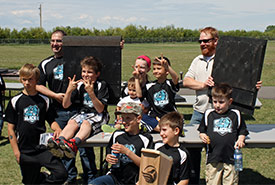
Students and their bat boxes (Photo by Sandi Riemersma)
Once the workbooks were complete, it was time to get outside and enjoy some sun. Students made bat boxes and ferruginous hawk nest platforms that will be strategically placed, with the help of the Alberta Conservation Association and AltaLink, to increase habitat. This at risk species is often limited by availability of suitable, undisturbed grassland habitat; particularly for nesting purposes. Bats in Alberta are also in need of more suitable habitat to help their populations recover from declines due to disease and lost nesting sites. Hawks help control gopher populations, whereas bats curb insect populations, making both species important parts of our ecosystems.
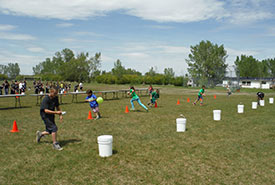
Water conservation relay (Photo by Kelsey Catwright/ NCC staff)
After breaking for a yummy barbeque there was a raffle and perhaps the most fun event — a water conservation relay! Teams were given the challenge of navigating an obstacle course while carrying measuring cups, and then measuring spoons, of water. Teams were judged on how much water they were able to get through the course and into the bucket on the other side.
All in all this was an excellent opportunity for OWC and NCC to reach out to youth. Students learned not only about their watershed and how it works, but what an important role conservation plays in keeping our ecosystems functional and intact. I was extremely proud to be part of youth education on watershed and conservation — causes close to my heart. A big thank you to Sandi Riemersma for not only making this event possible, but turning it into an enjoyable and memorable day for all participants. I had a ton of fun and these words offered by the vice principal in her opening speech rang in my ears for the rest of the day as I departed the inspiring community of Blackie:
"We do not inherit the earth, we only borrow it from our grandchildren." — Wendell Berry

